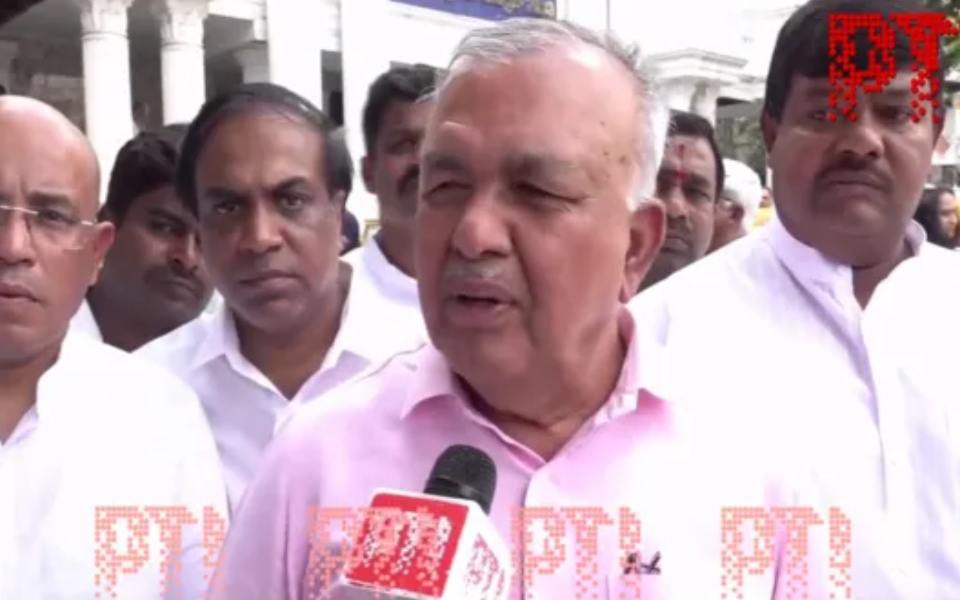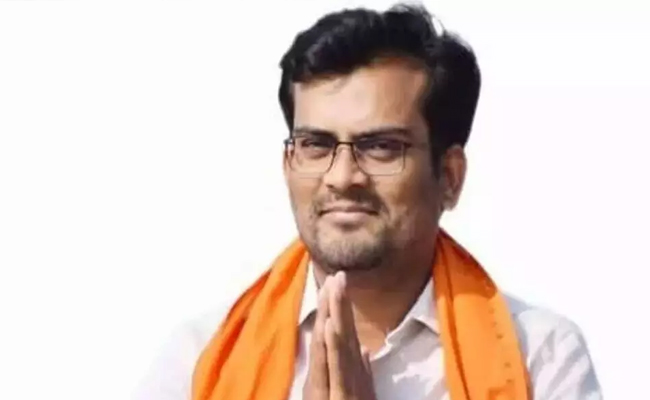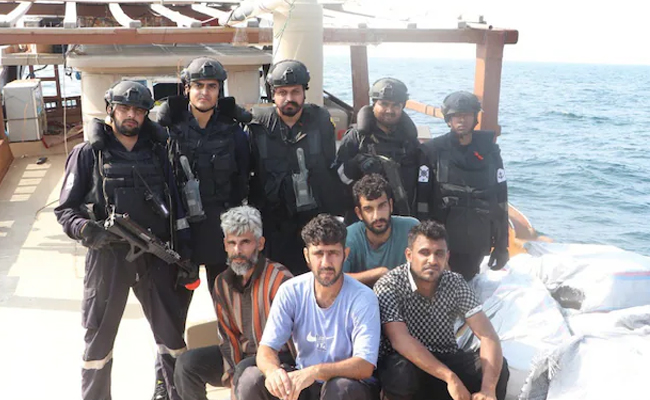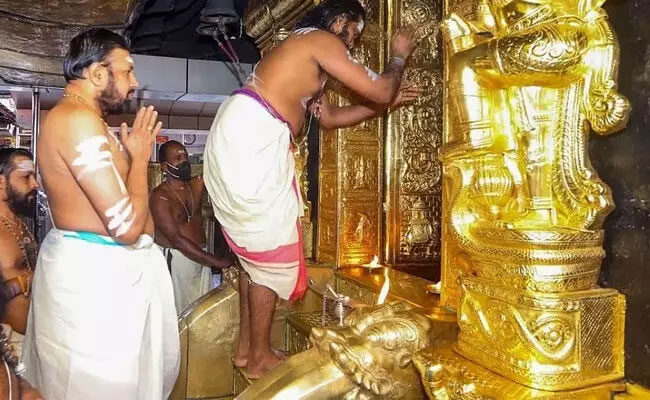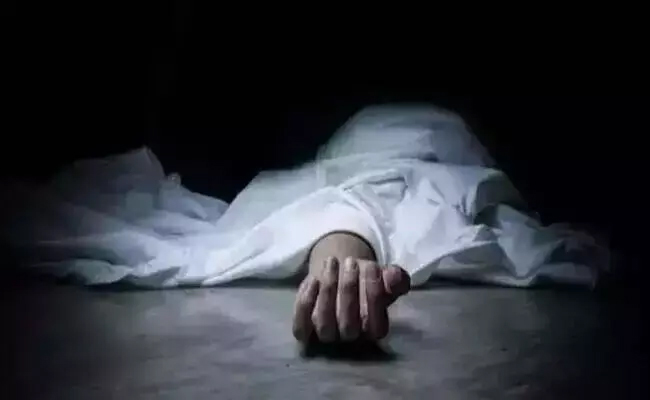Bengaluru, Feb 22: The Karnataka government's move to collect funds from temples with over Rs 10 lakh annual income has angered the opposition BJP, which charged the ruling Congress with trying to fill its 'empty coffers' with temple money. A related Assembly bill was passed on Wednesday.
Defending the move as aimed at ensuring welfare of different sections, the Congress sought to turn the tables on its rival saying the saffron party had effected an amendment in 2011 to seek funds from high-income Hindu shrines.
The Karnataka Hindu Religious Institutions and Charitable Endowments (Amendment) Bill was passed in the state Assembly on February 21.
Regarding the bill, the government said it was necessary to enhance the amount of common pool fund, include a person skilled in Vishwa Hindu Temple architecture and sculpture in the committee of management of notified institutions and to form district and state-level committees to improve shrines and infrastructure for the safety of pilgrims.
ALSO READ: Karnataka govt to form panel to decide on lifting ban on eucalyptus plantation
Transport and Hindu Religious Endowments minister Ramalinga Reddy told reporters that the provision was not new but has existed since 2003.
He also said an amendment was brought by the then BJP government in 2011 to collect funds from high income group temples.
Karnataka Hindu Religious Institutions and Charitable Endowments Act 1997 came into force on May 1, 2003 and provisions were made for Common Pool Fund under Section 17 of the said Act, he explained.
Common Pool Fund was implemented in the year 2003 itself. Section 17 of the Act was amended in 2011 to collect funds from high income group temples so as to aid temples with lesser income under the said fund.
The Rajya Dharmika Parishad, a committee to improve the temple management for the benefit of pilgrims, is authorised to utitlise Common Pool, Reddy said.
According to him, there were 3,000 C-Grade temples in Karnataka, which have an annual income of less than Rs 5 lakh from where the 'Dharmika Parishad' gets no money.
Temples earning between Rs 5 lakh and Rs 25 lakh were classified as B-grade temples, from where 5 per cent of the gross income had been going to the committee since 2003.
The Dharmika Parishad had been getting 10 per cent revenue from those temples whose annual gross income was above Rs 25 lakh since 2003.
"Now what we have done is we have made it free from paying to Dharmika Parishad if the income is up to Rs 10 lakh. We have made provisions to collect five per cent from temples whose gross income is between Rs 10 lakh and less than a crore. 10 per cent will be collected from temples whose income is above Rs 1 crore. All this amount will reach the Dharmika Parishad," Reddy said.
The Minister said there are 40,000 to 50,000 priests in the state whom the state government wants to help.
"If the money reaches Dharmika Parishad then we can provide them insurance cover. We want their families to get at least Rs 5 lakh if something happens to them. To pay the premium we need Rs 7 crore to 8 crore (annually)," he explained.
The Minister said the government wants to provide scholarships to children of temple priests, which would require Rs 5-6 crore per year and housing facilities for C group priests and temple employees.
"This entire amount will benefit the temple priests only, many of whom are in poor condition," he said.
Government sources said the purpose behind the bill is to provide facilities and safety to pilgrims within the jurisdiction of Group 'A' temples.
A district level and state high-level committee will be constituted to scrutinise, review and submit the proposals regarding the construction and maintenance of buildings, roads and tunnels, electricity supply and maintenance, water supply and sanitation, construction of recreation centres and libraries to provide necessary facilities to pilgrims and to provide safety to pilgrims within the jurisdiction of Group "A" Temples, they added.
Taking exception to the move, BJP state president B Y Vijayendra said, "Corrupt, inept #LootSarkaar with its penchant for anti-Hindu ideology in the guise of secularism, has cast its evil eyes on the temple revenues."
"Through the Hindu Religious Endowments amendment act, it is trying to siphon-off donations as well as offerings from Hindu temples and religious institutions in order to fill its empty coffers," he said in a post on 'X.'
The Shivamogga MLA said the the government plans to "gobble" up 10 per cent of the temple revenue exceeding Rs 1 crore and 5 percent of those below Rs 1 crore.
"This not only reflects the deplorable condition of this government, but also shows its abject hate towards Hindu Dharma," he charged.
Temple funds should be dedicatedly utilised for renovation of temples and to facilitate work beneficial to devotees, rather than diverting it for other purposes, which would be an injustice and betrayal of people's religious beliefs, the BJP state chief said.
Why only Hindu temples are targeted for revenue, leaving out other religions, is a question raised by millions of devotees, he said.
"Instead of grabbing the devotees' money, government can install donation boxes so that the concerned citizens can help this penniless govt boost its revenue as a gesture of goodwill," he stated.
Union Minister and BJP leader Rajeev Chandrasekhar too slammed the Congress government in the state over the Hindu Religious Institutions and Charitable Endowment Bill and called it a "new low" for the state's ruling party.
Corrupt, inept #LootSarkaar with its penchant for anti Hindu ideology in the guise of secularism, has cast its evil eyes on the Temple🛕 revenues. Through the Hindu Religious Endowments amendment act, it is trying to siphon off donations as well as offerings from Hindu temples… pic.twitter.com/Vzf9RQTaP4
— Vijayendra Yediyurappa (@BYVijayendra) February 22, 2024
Let the Truth be known. If you read VB and like VB, please be a VB Supporter and Help us deliver the Truth to one and all.
Bengaluru (PTI): BJP MLA Dr Chandru Lamani, caught allegedly accepting a Rs 5 lakh bribe from a contractor, has been remanded to judicial custody until March 3.
The Shirahatti MLA, a doctor, was brought from Gadag to Bengaluru on Saturday night and produced before a Special Court for Public Representatives, sources said.
The court remanded him to custody until March 3.
The MLA was caught in a Lokayukta trap following a complaint by Vijay Pujar, a Class-1 contractor from Chinchali in Gadag district.
Lokayukta officials said the alleged bribe was linked to Minor Irrigation Department works, including the construction of retaining walls along a road. The accused had demanded Rs 11 lakh from the complainant to execute the project, and Rs 5 lakh was accepted during the trap.
Along with Lamani, his personal assistants, Manjunath Valmiki and Guru Naik, were also arrested in connection with the case.

